Cùng nói về Mèo Bengal
Tên chính thức: Mèo Bengal
Các tên khác: Leopard, Leo
Nguồn gốc: Hoa Kỳ
Chiều dài lông
1 out of 5Mức độ rụng lông
1 out of 5Nhu cầu chải chuốt
2 out of 5Mức năng lượng*
4 out of 5Xu hướng gây ồn ào
1 out of 5Thú cưng trong gia đình?*
5 out of 5Khả năng hòa đồng với các thú cưng khác
4 out of 5Có thể ở một mình?*
2 out of 5Môi trường (trong nhà/ngoài trời)
4 out of 5
| Male | Female |
|---|---|
| Height | Height |
| - cm | - cm |
| Weight | Weight |
| 4 - 6 kg | 3 - 5 kg |
| Life stages | |
|---|---|
| Mèo con đang lớn | Giai đoạn trưởng thành |
| 4 đến 12 tháng tuổi | 1 đến 7 năm |
| Trưởng thành | Lớn tuổi |
| 7 đến 12 năm | Từ 12 năm trở lên |
Chiều dài lông
1 out of 5Mức độ rụng lông
1 out of 5Nhu cầu chải chuốt
2 out of 5Mức năng lượng*
4 out of 5Xu hướng gây ồn ào
1 out of 5Thú cưng trong gia đình?*
5 out of 5Khả năng hòa đồng với các thú cưng khác
4 out of 5Có thể ở một mình?*
2 out of 5Môi trường (trong nhà/ngoài trời)
4 out of 5
| Male | Female |
|---|---|
| Height | Height |
| - cm | - cm |
| Weight | Weight |
| 4 - 6 kg | 3 - 5 kg |
| Life stages | |
|---|---|
| Mèo con đang lớn | Giai đoạn trưởng thành |
| 4 đến 12 tháng tuổi | 1 đến 7 năm |
| Trưởng thành | Lớn tuổi |
| 7 đến 12 năm | Từ 12 năm trở lên |
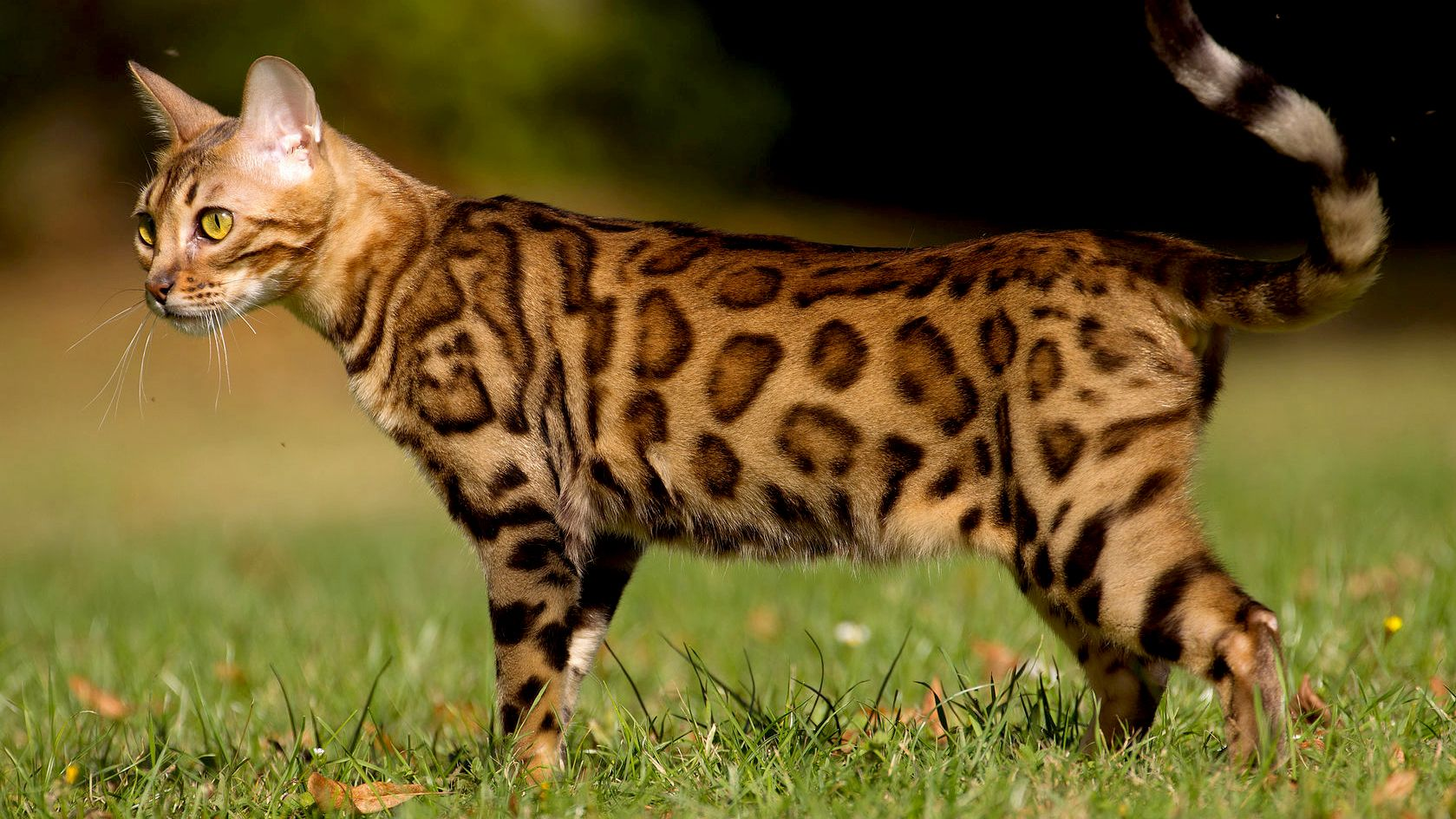
Tìm hiểu về Mèo Bengal
Tất cả những gì bạn cần biết về giống chó này
Nếu có một giống mèo là hiện thân của biệt danh "chú mèo tò mò", thì đó chính là Mèo Bengal. Ở chúng toát lên vẻ bạo dạn, mong muốn được ra ngoài và khám phá môi trường xung quanh trong nhà và khi đứng trước một sinh vật tuyệt đẹp như vậy, thật dễ dàng để bắt đầu cuộc phiêu lưu. Mèo Bengal không tỏ ra chút sợ sệt, luôn thể hiện sự cuốn hút và không bận tâm đến đối tượng đang đứng nhìn.
Điểm thú vị nhất khi nuôi một chú Mèo Bengal xung quanh nhà là gì? Bộ lông điểm vân hoa hồng độc đáo tuyệt vời của chúng. Mèo Bengal là giống mèo duy nhất được tô điểm bằng những họa tiết không phổ biến này - có hình dạng hoa văn giống với những người anh em họ Leopard, Jaguar và Ocelot của chúng. Mèo Bengal màu tuyết là một biến thể khác của giống mèo này, có màu sắc đặc biệt chủ đạo là màu trắng - hãy nghĩ đến chú Mèo Leopard màu tuyết cỡ nhỏ! Đó là một gen lặn điểm màu tạo nên hoa văn màu trắng hoặc nâu nhạt, một họa tiết thực sự rất độc đáo.
Bộ lông của giống Mèo Bengal cũng có thể mang họa tiết đá cẩm thạch hoặc lốm đốm, với độ dày ấn tượng, một điểm nhấn khác; bất kể hình thức nào, thật không thể tin được.
Nếu bạn đánh giá cao việc sở hữu một con mèo luôn tràn đầy năng lượng, thì đây chính là giống mẹo dành cho bạn. Trên thực tế, Mèo Bengal có tính khí trẻ con ngay cả trong những năm tháng tuổi già. Sự lai tạo giữa một con mèo nhà với một con mèo rừng không làm mất đi nét độc đáo ở loài mèo này. Chúng nhanh nhẹn và khỏe mạnh một cách đáng kinh ngạc, rất mạnh mẽ nhưng vẫn vô cùng duyên dáng. Đối với những người mong muốn sở hữu Mèo Bengal, họ chắc chắn phải thốt lên những từ như diễm lệ, khác lạ và ấn tượng.
Mèo Bengal à một giống mèo kỳ lạ vì chúng rất thích nghịch nước, đôi khi chúng đi vào phòng tắm với các thành viên trong gia đình hoặc nhìn chằm chằm khi nước đang chảy dùng để nấu ăn, tắm, đánh răng hoặc thậm chí chỉ là rửa tay.
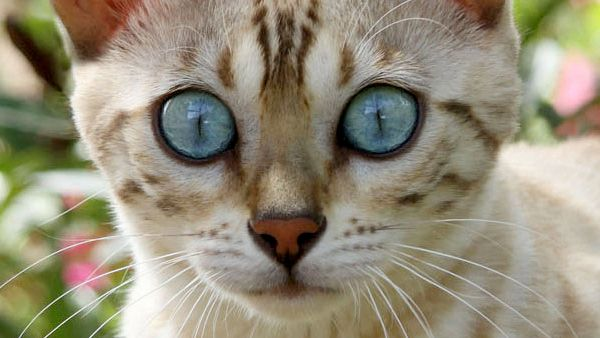
2 sự thật về Mèo Bengal
1. Vào khoảng năm 1963
Một trong những giống mèo gần đây nhất, Mèo Bengal chỉ được phát triển vào năm 1963 và được Hiệp hội mèo quốc tế cấp giấy chứng nhận trạng thái thử nghiệm vào năm 1983. Sau đó, giống mèo này đã được cấp trạng thái hoàn thành vào năm 1991
2. Dạy chúng một hoặc hai trò mẹo
Đừng nghĩ rằng chỉ có những chú chó mới có thể học được các trò mẹo: Loài mèo cực kỳ thông minh này cũng có thể. Mèo Bengal có thể được dạy ngồi, dựa, cào và thậm chí thực hiện các nhiệm vụ phức tạp hơn như tìm đồ. Chúng quá giỏi, bạn sẽ sớm tự hỏi ai đang kiểm tra ai...
Lịch sử của giống này
Mèo Bengal được lấy tên từ loài hổ Bengal vì chúng có bộ lông giống với người anh em họ xa của chúng. Thành thật mà nói, giống mèo nhà có nguồn gốc hoang dã: Mèo Bengal bắt đầu được nuôi trong nhà vào năm 1963 sau khi được phát triển bởi Jean Mill, một người lai giống mèo đầy đam mê đến từ Arizona. Người hâm mộ mèo đã lai tạo mèo báo Châu Á với chú mèo nhà màu đen của mình. Kết quả là Mèo Bengal có tính khí giống mèo nhà và vẻ ngoài mạnh mẽ như mèo rừng.
Sau đó Mill tiếp tục lai giống mèo cái con đầu tiên, sinh ra nhiều lứa mèo từ đó. Mèo Bengal sau đó được phát triển tại Đại học California ở Davis khi Mill hỗ trợ lai tạo tám con mèo con với một con Mèo Abyssinia Miến Điện và Mèo Mau Ai Cập.
Giống Mèo Bengal giờ đây đã trở nên thuần hóa hơn nhiều nhưng cũng là một vật sở hữu quý giá, trong giới mèo được biết đến với cái tên "Rolls Royce" của loài mèo.
Hiệp hội mèo quốc tế đã thông qua giống mèo này vào năm 1983, nhưng chỉ cấp cho nó trạng thái thử nghiệm. Mèo Bengal sau đó được cấp trạng thái hoàn thành vào năm 1991, và vào năm 1999, được công nhận là một giống mèo chính thức bởi Liên đoàn mèo quốc tế, một liên đoàn đăng ký danh tính mèo được tán dương rộng rãi.
Từ đầu đến đuôi
Đặc điểm thể chất của Mèo Bengal
1.Tai
2.Cái đầu
3.Thân hình
4.Đuôi
5.Lông thú
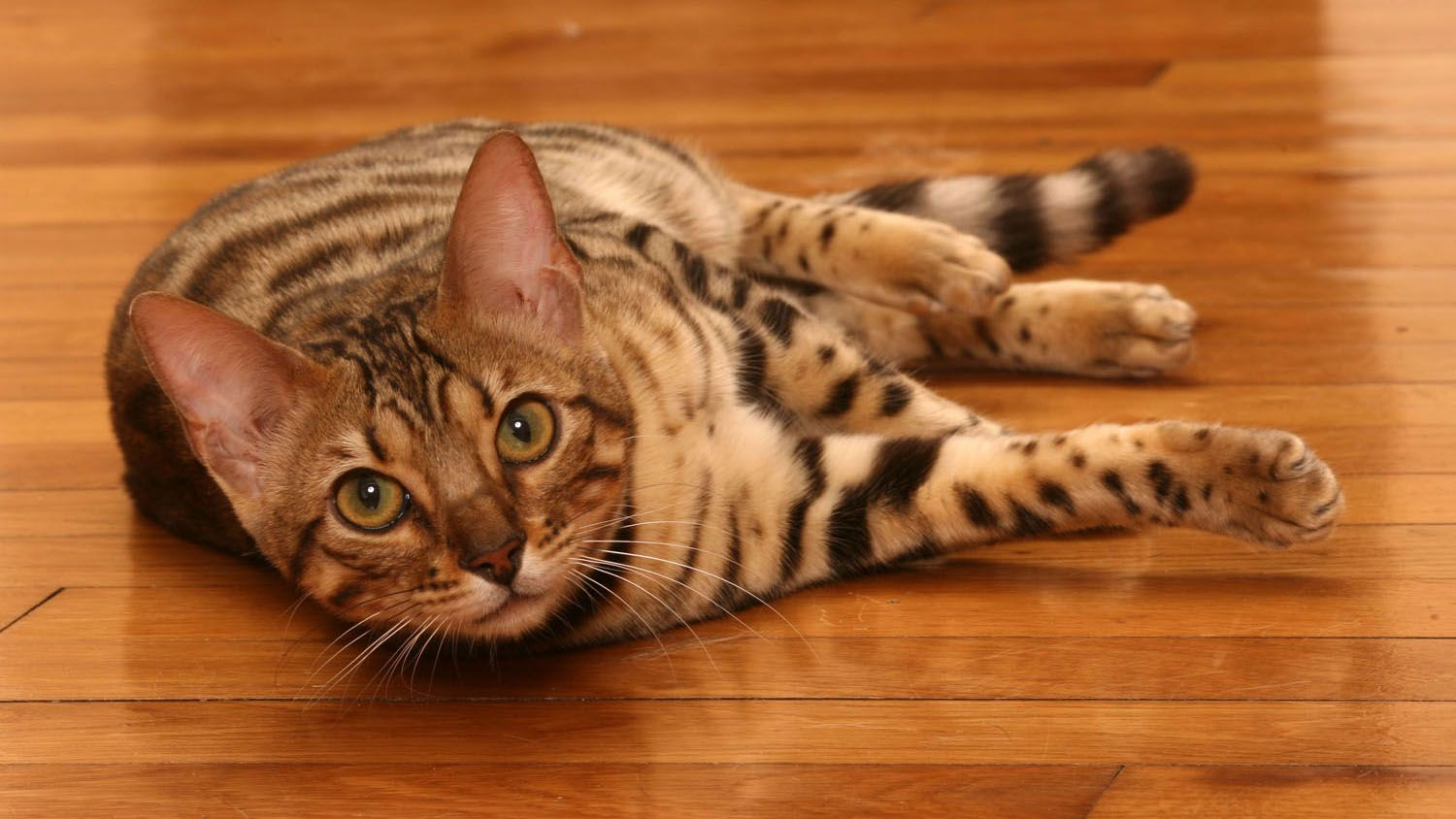
Những điều cần chú ý
Từ đặc điểm cụ thể về giống đến tổng quan chung về sức khỏe, đây là một số sự thật thú vị về Mèo Bengal
Thích leo trèo – hãy cẩn thận với những chiếc đèn chùm quý giá
Do rừng rậm là nơi sinh sống của tổ tiên chúng, nên Mèo Bengal thích leo trèo càng cao càng tốt, thường lên điểm cao nhất trong nhà. Bạn nên cất các vật gia truyền, đèn chiếu sáng đắt tiền và những đồ đạc có giá trị đi. Sự mạnh mẽ và không sợ hãi của chúng là một trong những đặc điểm đáng kinh ngạc của Mèo Bengal. Phần thú vị nhất: Bàn chân vô cùng khéo léo của chúng có thể hoàn thành rất nhiều nhiệm vụ phức tạp. Mèo Bengal có khả năng bật và tắt công tắc đèn!
Để ý đến chuột lang nhà!
Là thú cưng tuyệt vời trong gia đình, giống Mèo Bengal có thể có kỹ năng săn mồi rất đỉnh. Hãy nhớ rằng đây chỉ là thế hệ thứ tư kể từ khi giống mèo này xuất hiện - tức là chỉ cách bốn thế hệ so với tổ tiên hoang dã. Khi giống mèo này được biết đến (và trở nên phổ biến hơn) vào cuối những năm 1990, những người chủ tiềm năng phải xin giấy phép hoặc cấp phép để có thể sở hữu một con Mèo Bengal. Xu hướng bỏ đi sau bữa tối của chúng vẫn còn kéo dài. Hướng dẫn mèo tránh xa những vật nuôi nhỏ như chuột nhảy, chuột nhắt hoặc chuột lang có thể được nuôi chung trong nhà đề phòng mèo có ý định săn chúng. Mèo Bengal có đôi bàn chân khéo léo có thể thực hiện nhiều nhiệm vụ, như nâng đồ lên cao và nhặt đồ!
Không cần tính đến lượng calo - nhiều như vậy.
Cân nặng sẽ không bao giờ trở thành vấn đề đối với giống Mèo Bengal. Chúng đốt cháy calo nhanh hơn siêu mẫu trong suốt tuần lễ thời trang với tốc độ hoạt động cao và cách tiếp cận cuộc sống không ngừng nghỉ, chưa kể đến sự tò mò rất lớn của họ. Thức ăn tốt nhất cho Mèo Bengal là chất lượng cao, chứa các chất dinh dưỡng và khoáng chất thiết yếu mà chúng cần để phát triển tốt nhất khi lớn lên. Vì mèo cần ăn ít và thường xuyên, nên hãy cho chúng ăn nhiều lần trong ngày sau khi tính toán cẩn thận lượng thức ăn được cho phép. Không bao giờ cho Mèo Bengal ăn quá mức để duy trì vóc dáng tuyệt đẹp của chúng.
Chế độ ăn uống lành mạnh, mèo khỏe mạnh hơn
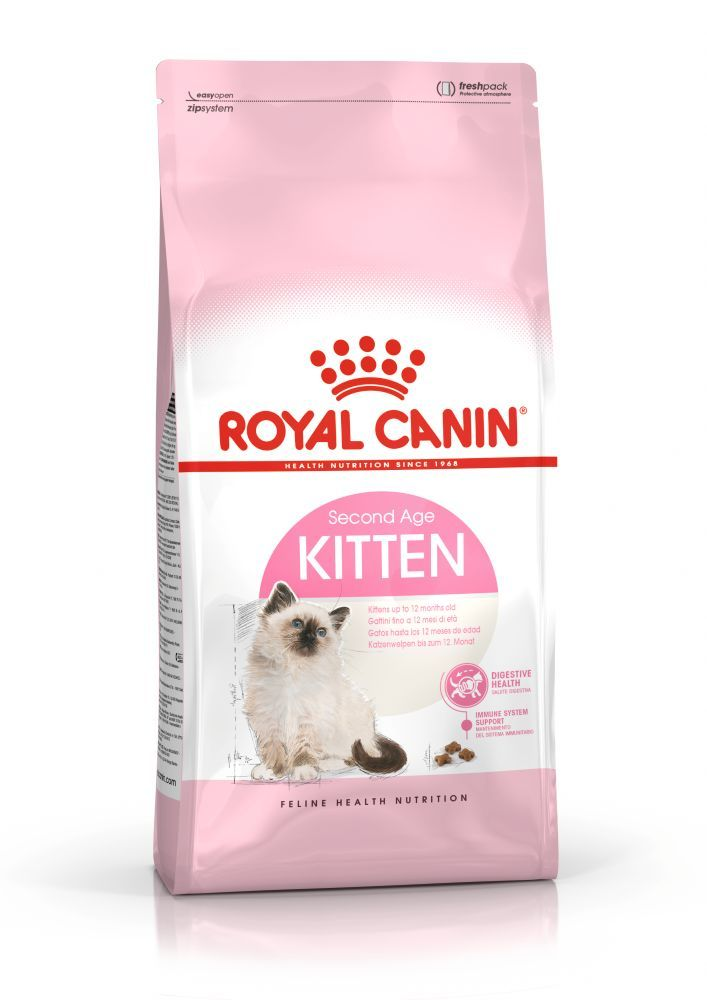
Chế độ dinh dưỡng phù hợp cho sức khỏe đóng vai trò cơ bản trong việc duy trì sức khỏe và vẻ đẹp của Mèo Bengal. Thức ăn cung cấp năng lượng giúp thực hiện các chức năng quan trọng và công thức dinh dưỡng hoàn chỉnh cho Mèo Bengal phải có sự cân bằng các chất dinh dưỡng thích hợp. Cho chúng ăn theo cách này sẽ cung cấp một chế độ ăn uống không bị thiếu hoặc thừa. Cả hai chế độ ăn uống này đều có thể gây ảnh hưởng xấu đến sức khỏe của mèo. Cần phải luôn có sẵn nước ngọt sạch để hỗ trợ tiểu tiện đều đặn, khỏe mạnh. Mèo cũng thích nghi một cách tự nhiên với việc ăn khẩu phần nhỏ – từ 7 đến 10 lần một ngày. Cho mèo ăn khẩu phần thức ăn hạt hàng ngày theo khuyến nghị một lần một ngày sẽ giúp chú Mèo Bengal của bạn tự điều chỉnh mức tiêu thụ. Sau đây là những khuyến nghị giúp động vật luôn khỏe mạnh. Nếu mèo của bạn có vấn đề về sức khỏe, vui lòng tham khảo ý kiến của bác sĩ thú y, họ sẽ chỉ định chế độ ăn theo toa dành riêng cho mèo.
Tăng trưởng là một giai đoạn thiết yếu trong cuộc đời của mèo con. Đó là thời điểm của những thay đổi lớn, khám phá và gặp gỡ những điều mới mẻ. Yêu cầu của một chú mèo con thuộc giống Bengal, về năng lượng, protein, khoáng chất và vitamin, lớn hơn nhiều so với mèo trưởng thành. They need energy and nutrients to maintain their body, but also to grow and build it. Sự phát triển của mèo con có hai giai đoạn:
Xây dựng
Từ sơ sinh đến 4 tháng tuổi
Cai sữa là sự chuyển đổi từ thức ăn lỏng – hoặc sữa mẹ – sang thức ăn đặc. Thời kỳ này đương nhiên tương ứng với thời điểm chúng cắt răng sữa, lúc trẻ được 3 đến 6 tuần tuổi. Ở giai đoạn này, mèo con vẫn chưa thể tập lẫy, vì vậy một bữa ăn mềm (thức ăn hạt đã được bù nước hoặc thức ăn ướt đã điều chỉnh) sẽ giúp thu hẹp khoảng cách giữa chất lỏng và chất rắn.
Từ 4 đến 12 tuần sau khi sinh
Từ 4 đến 12 tuần sau khi sinh, khả năng miễn dịch tự nhiên của mèo con nhận được từ sữa non của mẹ - hoặc sữa đầu - giảm trong khi hệ thống miễn dịch của mèo con dần dần phát triển. Thời điểm quan trọng này, được gọi là lỗ hổng miễn dịch, cần một phức hợp các chất chống oxy hóa, bao gồm cả vitamin E, để giúp hỗ trợ khả năng phòng thủ tự nhiên của chúng. Mèo con trải qua một giai đoạn phát triển dữ dội và đặc biệt mỏng manh, trong đó chúng dễ bị rối loạn tiêu hóa. Chế độ ăn uống của chúng lúc này không chỉ cần giàu năng lượng để đáp ứng nhu cầu tăng trưởng thiết yếu mà còn phải chứa nhiều protein dễ tiêu hóa để chăm sóc cho hệ tiêu hóa vẫn đang phát triển. Prebiotic, chẳng hạn như fructo-oligosaccharides, hỗ trợ sức khỏe tiêu hóa bằng cách giúp cân bằng hệ thực vật đường ruột, dẫn đến chất lượng phân tốt. Kết quả? Chất lượng phân tốt, đóng thành khuôn. Thức ăn của mèo con nên chứa axit béo omega 3 – EPA-DHA – giúp hỗ trợ sự phát triển thần kinh não thích hợp.
Hợp nhất và hài hòa: từ 4 đến 12 tháng
Từ tháng thứ tư, tốc độ tăng trưởng của mèo con chậm lại, vì vậy nên cho ăn thức ăn ít chất béo hơn. Điều này đặc biệt quan trọng sau khi mèo được triệt sản. Từ 4 đến 7 tháng, răng sữa của mèo con rụng và được thay thế bằng răng vĩnh viễn. Khi răng trưởng thành mọc, mèo con cần ăn thức ăn hạt đủ lớn để chúng được khuyến khích gặm. Cho đến khi chúng được 12 tháng tuổi, hệ thống miễn dịch của Mèo Bengal con vẫn đang dần phát triển. Một phức hợp các chất chống oxy hóa, bao gồm vitamin E, có thể giúp hỗ trợ khả năng miễn dịch tự nhiên của chúng trong thời gian xảy ra những thay đổi lớn, các cuộc khám phá và gặp gỡ mới này. Hệ tiêu hóa dần hoàn thiện, với các năng lực tiêu hóa đạt đến độ trưởng thành hoàn toàn vào mười hai tháng tuổi. Sau đó, một con mèo Bengal có thể tiêu thụ thức ăn của mèo trưởng thành.

Ngoài việc duy trì chức năng tiết niệu khỏe mạnh như đối với tất cả các giống mèo, các mục tiêu dinh dưỡng chính cho Mèo Bengal trưởng thành là:
Góp phần duy trì khối lượng cơ tối ưu cho chú mèo hoạt bát này, nhờ vào lượng protein chất lượng cao và hàm lượng chất béo vừa phải
Hỗ trợ tiêu hóa tối ưu và cân bằng hệ vi khuẩn đường ruột bằng cách sử dụng protein dễ tiêu hóa và prebiotics
Giúp giữ gìn sức khỏe của làn da và độ bóng của bộ lông ngắn, với sự bổ sung phong phú của các chất dinh dưỡng mục tiêu, chẳng hạn như amino axit, vitamin và axit béo omega-3 và omega-6
Hỗ trợ vệ sinh răng miệng tốt nhờ hình dáng thức ăn hạt dễ lấy và kết cấu tạo cảm giác nhai.
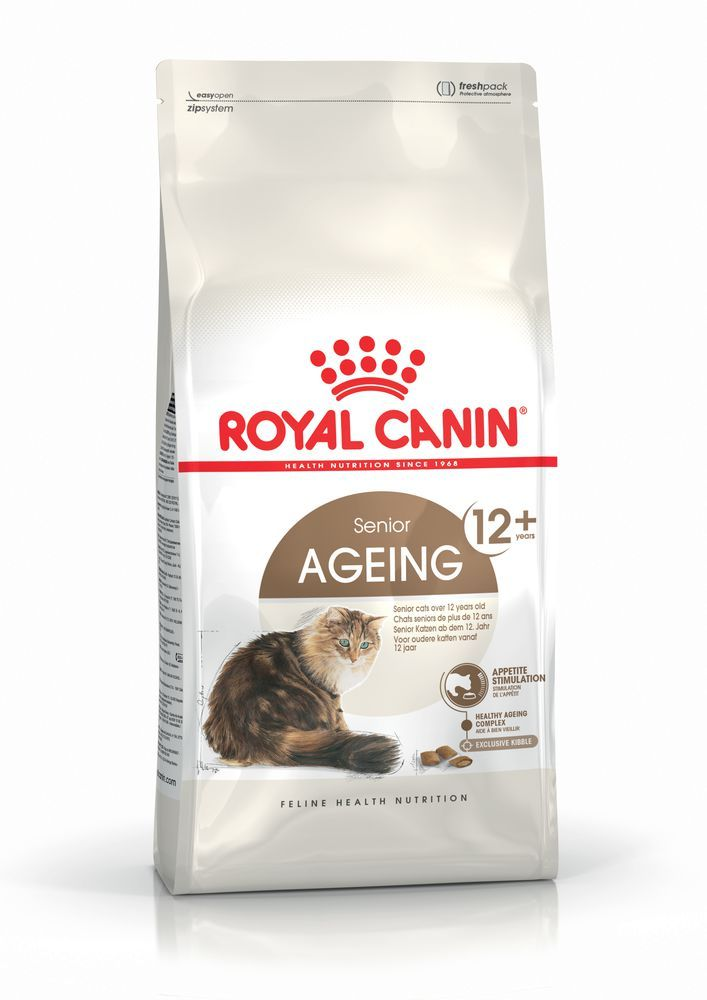
Mèo lớn tuổi – mèo trên 12 tuổi – đôi khi cũng có thể gặp khó khăn trong việc hấp thụ. Để duy trì trọng lượng của mèo già và giảm thiểu nguy cơ thiếu hụt chất dinh dưỡng, bạn nên cung cấp cho chúng thức ăn dễ tiêu hóa với đầy đủ các chất dinh dưỡng cần thiết.
Khi già đi, mèo ngày càng mắc nhiều vấn đề về răng. Ở một số chú mèo lớn tuổi, vị giác và khứu giác cũng có thể suy giảm, điều này có thể dẫn đến việc tiêu thụ ít thức ăn hơn. Để giúp mèo tiếp tục ăn đủ lượng thức ăn, bạn cần phải đảm bảo hình dạng, kích thước và độ cứng - có nghĩa là kết cấu - của thức ăn hạt phù hợp với bộ hàm giờ đây dễ vỡ hơn của chúng.
Lưu ý rằng mức năng lượng tốt nhất cho bất kỳ chú mèo nào vẫn phụ thuộc vào lối sống của chúng, thậm chí cả những chú mèo đang già. Mèo lớn tuổi vẫn đi ra ngoài thường xuyên sẽ được hưởng lợi từ chế độ ăn uống có hàm lượng chất béo cao hơn đôi chút. Mặt khác, quá trình lão hóa không làm giảm nguy cơ béo phì của mèo nuôi trong nhà. Lượng calo nạp vào của chúng vẫn cần được theo dõi chặt chẽ. Thực phẩm có hàm lượng chất béo vừa phải có thể là lựa chọn tối ưu.
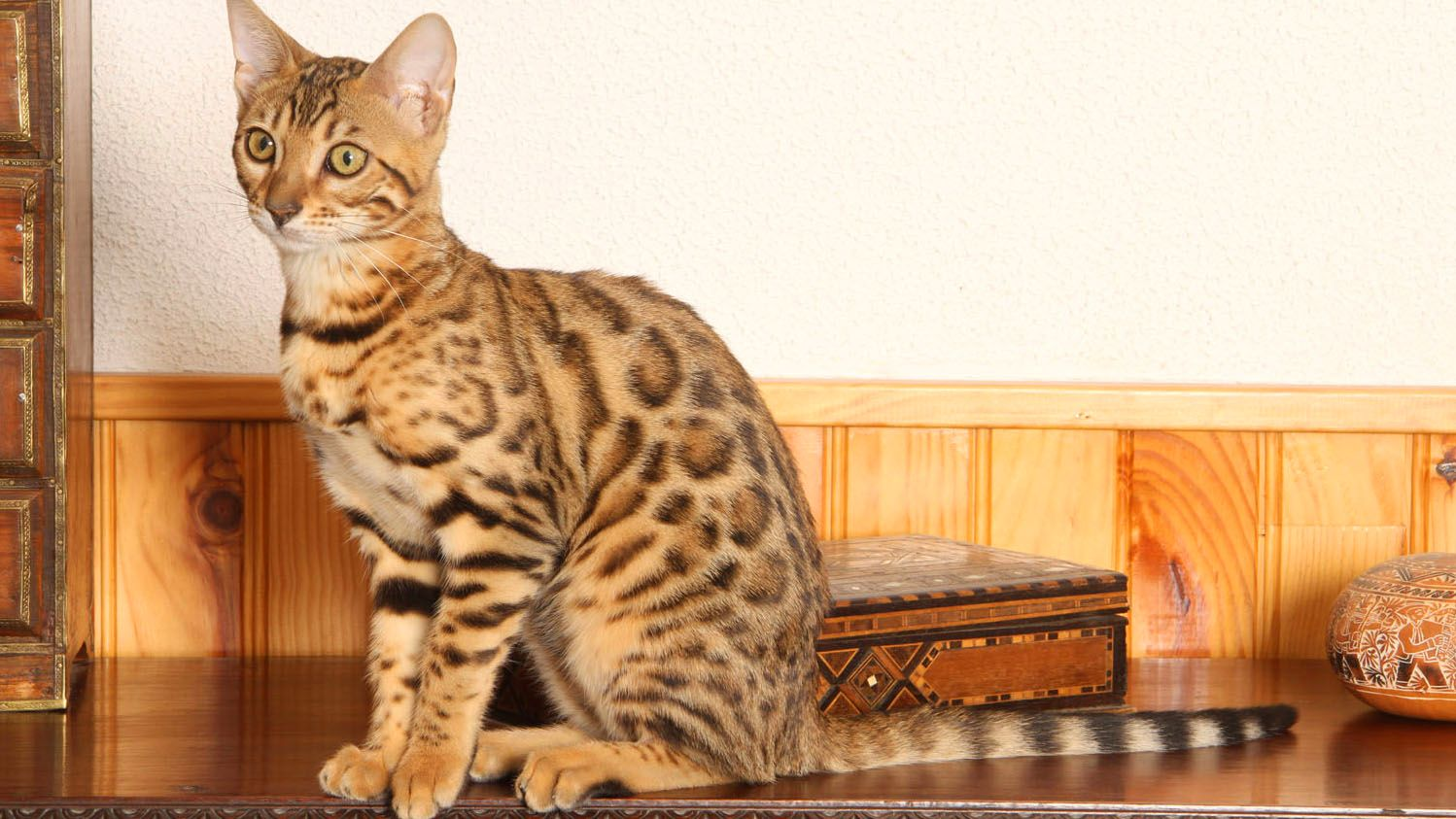
Chăm sóc Mèo Bengal
Mẹo chăm sóc lông, huấn luyện và tập thể dục
Mang phân nửa tập tính của mèo rừng nghĩa là Mèo Bengal có được sự nhanh nhẹn và sức mạnh trời ban. Như một vận động viên bẩm sinh, chúng sẽ cần không gian để đi lang thang trong nhà và ngoài trời, và tuân theo bản năng tự nhiên khi khám phá cây cối và bụi rậm trong khu vực sống của chúng. Hãy để ý chúng khi ở ngoài trời để chúng không đi lang thang và đảm bảo an toàn trước những kẻ săn mồi, xe cộ hoặc kẻ trộm, nguy cơ đối với bất kỳ loài mèo nào.
Chăm sóc bộ lông tuyệt đẹp của Mèo Bengal sẽ là niềm vui cho bất cứ ai nuôi giống mèo hiếu động này. Đây là loài mèo tương đối dễ chăm sóc - nghĩa là không có gì đáng bận tâm về chúng. Chỉ cần chải lông cho chúng mỗi tuần một lần và duy trì tình trạng rụng lông ở mức ít. Bạn không cần tắm cho Mèo Bengal thường xuyên để giữ bộ lông ít chăm sóc của chúng luôn tuyệt đẹp. Cắt móng định kỳ hàng tháng để dễ chăm sóc.
Mèo Bengal tiếp thu các trò khéo rất nhanh và dễ huấn luyện hơn nhiều giống mèo khác. Chúng rất trung thành với chủ nhân và hòa thuận khi sống cùng những vật nuôi khác. Cực kỳ lanh lợi và chăm chú, chúng thậm chí còn được biết đến với khả năng có thể mở cửa và tủ nhà bếp bằng bàn chân trước của mình!
Mang phân nửa tập tính của mèo rừng nghĩa là Mèo Bengal có được sự nhanh nhẹn và sức mạnh trời ban. Như một vận động viên bẩm sinh, chúng sẽ cần không gian để đi lang thang trong nhà và ngoài trời, và tuân theo bản năng tự nhiên khi khám phá cây cối và bụi rậm trong khu vực sống của chúng. Hãy để ý chúng khi ở ngoài trời để chúng không đi lang thang và đảm bảo an toàn trước những kẻ săn mồi, xe cộ hoặc kẻ trộm, nguy cơ đối với bất kỳ loài mèo nào.
Chăm sóc bộ lông tuyệt đẹp của Mèo Bengal sẽ là niềm vui cho bất cứ ai nuôi giống mèo hiếu động này. Đây là loài mèo tương đối dễ chăm sóc - nghĩa là không có gì đáng bận tâm về chúng. Chỉ cần chải lông cho chúng mỗi tuần một lần và duy trì tình trạng rụng lông ở mức ít. Bạn không cần tắm cho Mèo Bengal thường xuyên để giữ bộ lông ít chăm sóc của chúng luôn tuyệt đẹp. Cắt móng định kỳ hàng tháng để dễ chăm sóc.
Mèo Bengal tiếp thu các trò khéo rất nhanh và dễ huấn luyện hơn nhiều giống mèo khác. Chúng rất trung thành với chủ nhân và hòa thuận khi sống cùng những vật nuôi khác. Cực kỳ lanh lợi và chăm chú, chúng thậm chí còn được biết đến với khả năng có thể mở cửa và tủ nhà bếp bằng bàn chân trước của mình!
7/7
Tất tần tật về Mèo Bengal
Đọc thêm về chủ đề này
Nguồn
- Trung tâm thú y Hoa Kỳ https://vcahospitals.com/
- Bách khoa toàn thư của Royal Canin về loài mèo. Ấn bản năm 2010 và 2020
- Banfield Pet Hospital https://www.banfield.com/
- Sách về sản phẩm BHN của Royal Canin
Thích và chia sẻ trang này